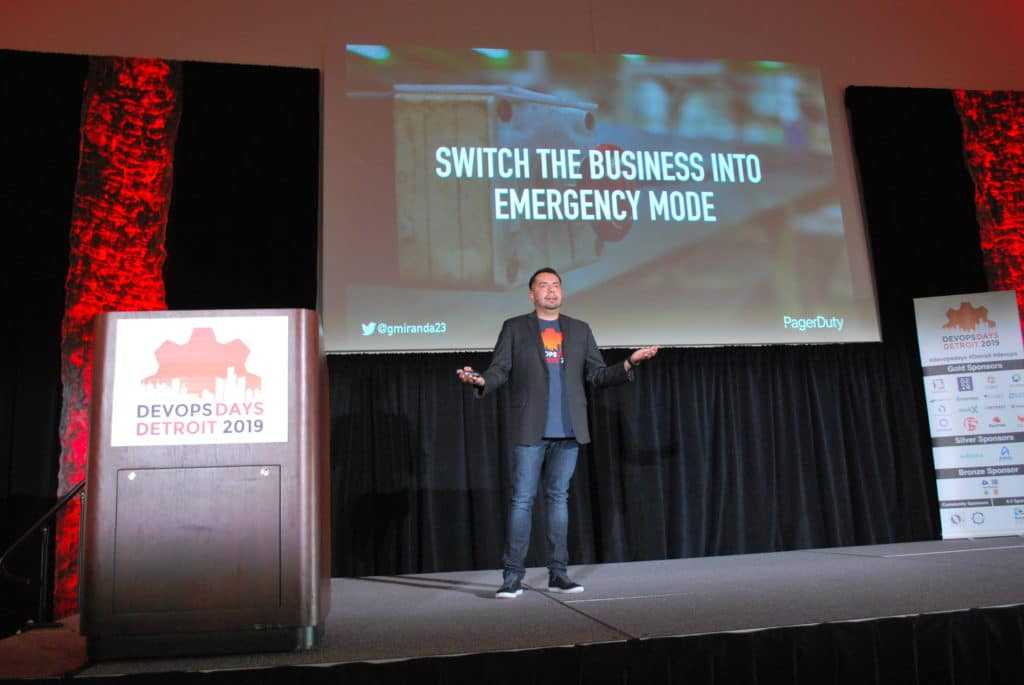Overcoming Organizational Resistance with PagerDuty's George Miranda
By Laura Cowan
Laura K. Cowan is a tech, business, and wellness journalist and fantasy author whose work has focused on promoting sustainability initiatives and helping individuals find a sense of connection with the natural world.
George Miranda speaks at the recent DevOps Days Detroit 2019 at Detroit's College for Creative Studies in New Center.
"I get to do non product-specific things for my company," says George Miranda, who recently spoke at DevOps Days Detroit on handling disasters in devops. "That often boils down to creating a how-to for organizations." We met with him backstage to talk more in depth about the work Miranda and his team have put into outlining best practices for devops professionals--or now for anyone in business--who wants to learn more about how to manage operations. He and his team at PagerDuty recently launched several protocols the company is sharing with the public to this end.
Just launched November 5th after the DevOps conference is the PagerDuty Retrospectives Guide on best practices for retrospective analysis of rollouts.
We asked Miranda about the perennial problem of founders and tech professionals not having time to connect at physical events, and asked if he had a vision for helping in his arena to create new ways for tech industry pros to connect with each other and with best practices.
"That's a big problem," Miranda agreed, "because events like this are a lot of investment in time and cost, and not everybody can sneak away. One of our approaches is to take these operational frameworks, and we open source them and we put them in Github. We collaborate with people where they are doing their work and shaping their practices, and hopefully it's much easier to reach [people]. But I think you're right that to some extent you have to do that online and get to people where they are. We've tried to run our own community, and while that works well for PagerDuty customers, non-customers we don't really attract."
Miranda says that one of the things they're trying to do now at PagerDuty is find out where these conversations are happening. "We struggle with this because there's not one good online central resource," he says. Creating resources to help others and broadcasting their availability has been the best approach so far, in addition to other community building efforts.
Miranda offered up several other in-depth resources PagerDuty has developed for devops professionals looking for resources to develop response processes similar to those PagerDuty has developed for post-mortems and more. If you missed them in our event coverage, they are still available here:
DevOps Crisis Response Resources
business-response.pagerduty.com for Business Incident Response
pagerduty.com/ops-guides Ops Guides for Diving Deep
response.pagerduty.com Before, During & After Incidents
postmortems.pagerduty.com Post Mortem Process
But that's not all PagerDuty is doing. Because every company is a tech company these days, Miranda and his team have been expanding these guides to include all areas of business to use the same processes that help technical professionals help everyone else. In fact, Miranda cringes at the entire concept of technical or non-technical. It just doesn't work that way anymore. He tells us how this mindset coalesced for him over time.
DevOps Transformation Barriers
"I was an engineer for a long time," Miranda tells us, "then I switched to the vendor side of things. I was in the video gaming industry. We didn't have a term for it at the time, but we were trying to do digital devops transformation, and I ran into all sorts of barriers with my company running into legacy processes and systems and resistance to change.
"I met some people at Chef Software who were saying the same things I was and were on the same page, and I realized there was an opportunity to do this in a more impactful way. I started to work for vendors who were looking to transform day-to-day practices, folks that have the job I once had. What brought me to PagerDuty is the community team there works on open-source frameworks that do exactly that."
Miranda's work as an advocate for these best practices focuses on helping people shape effective processes to manage operations on the technical side of a company, but he's now expanding that to many areas of operations where these processes now apply. That has led to his team's recent releases of the Retrospectives guides in particular, which help professionals in all areas of a company master the process behind a blameless retrospective--to figure out what worked and what didn't in a rollout.
The Detroit skyline seen from the DevOps Days conference at New Center. Wayne State University in the foreground.
What's Next: DevSecOps
What's next? First up, security or DevSecOps. "We want to take these collaborative practices beyond the technical engineering side of organizations," Miranda says, and that involves not only best practice guides but a lot of coaching on how to overcome organizational resistance to new processes.
"Tech has pervaded so much more of an organization," Miranda tells us of the competent professionals he sees from every industry and silo that have domain expertise in their own space, "that everyone has a technology stack in their silo they rely on, whether that's a CRM tool like Salesforce or accounting tool or technology they use in legal." It's not tech versus non-tech, he insists, because everyone is using technology to do their jobs these days, it just makes sense to look to people in engineering who have managed these processes first to find leadership in best practices. "Increasingly it makes sense to look toward tech folks who have been dealing with how to manage that to figure out how to make that process less painful."
The step-by-step Post Mortems Guide is the best place to start with the more technical process, Miranda says. "How do you actually do it? Which words do you use? Which words do you choose not to use? How do you set up a meeting with the right agenda to push that along? We're trying to give you that process. Maybe you don't do 100% of that process or even 70%, but it gives you the right frame of mind for what the organization is trying to build." The Retrospectives Guide is less focused on technical incidents and more focused on how organizations can analyze recent work to see what worked and what didn't in a broader sense.
If you would like to see full videos of George Miranda's speech at DevOps Detroit, it's now available. We will be following up with several other speakers from DevOps Days Detroit as well over the next few months, including RedHat's Chris Short, inclusion advocate and engineer Quintessence Anx and more to hear their behind the scenes passion projects and perspectives on industry trends.
devops, devops best practices, devops detroit, george miranda, pagerduty, pagerduty post mortem guide




